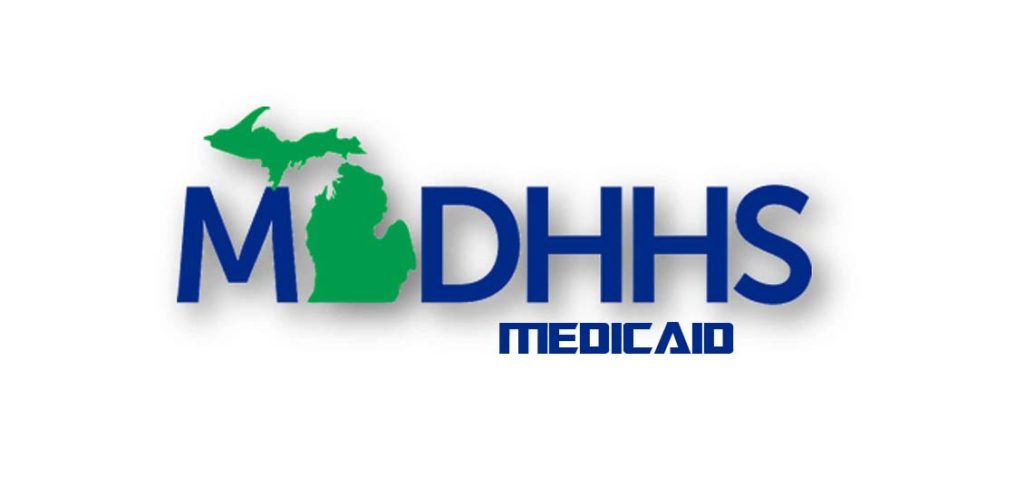MDHHS Medicaid (also called Medical Assistance or MA) is health insurance for people with low income. In Michigan, there is traditional Medicaid (TM) and the Healthy Michigan Plan (HMP). HMP started in 2014 as part of the Affordable Care Act. Once you are enrolled, TM and HMP work just like other health insurance.
Medicaid is a health care program that provides comprehensive health care services to low-income adults and children. Services covered by Medicaid are offered through what is called fee-for-service or through Medicaid Health Plans:
Fee-for-service is the term for Medicaid paid services that are not provided through a health plan. This means that Medicaid pays for the service. People under fee-for-service will use the mihealth card to receive services.

MDHHS Medicaid
In the MDHHS Medicaid program, most people must join a health plan. The health plan pays for most of the services. For people that need to join a health plan, Michigan Enrolls will send a letter with more information. After enrollment with a health plan, both the mihealth card and the health plan card are needed to access services.
The platform partners provide critical health care coverage to Michiganders and have continued to do so during the pandemic,” said Kate Massey, director of MDHHS’s Medical Services Administration.
“They took a financial hit when many medical appointments were canceled as a result of COVID-19. These federal dollars are available to help providers so that they can continue to assist Medicaid beneficiaries.”
Most of MDHHS Medicaid Covered Services
Medicaid and MIChild cover medically necessary services such as:
- ambulance
- chiropractic
- dental
- doctor visits
- emergency services
- family planning
- hearing and speech services
- home health care
- hospice care
- inpatient and outpatient hospital care
- lab
- medical supplies
- medicine prescribed by a doctor
- mental health services
- non-emergency medical transportation
- nursing home care
- personal care services
- physical and occupational therapy
- podiatry (foot care)
- pregnancy care (prenatal, delivery, and post-partum)
- private duty nursing
- immunizations (shots)
- substance use disorder treatment services
- surgery
- vision
- x-ray
A yearly health exam is covered. Some of these services are limited and may not be covered for beneficiaries age 21 and older. Some of these services may require prior approval. You can get more details here.
Michigan’s Home And Community-Based Services Waiver Programs
- MI Choice, which allows eligible adults to receive Medicaid-covered services like those provided by nursing homes while staying in their own home or in another community residential setting.
- MI Health Link, which offers adults age 21 and older enrolled in both Medicaid and Medicare a broad range of medical and behavioral health services, pharmacy, home, and community-based services, and nursing home care, all in a single program designed to meet individual needs. The MI Health Link is for people who live in Barry, Berrien, Branch, Calhoun, Cass, Kalamazoo, Macomb, St. Joseph, Van Buren, or Wayne counties or any county in the Upper Peninsula.
- Children’s Waiver Program, which provides for Medicaid to pay for services for children who are under age 18, have a documented developmental disability, and need medical or behavioral supports and services at home.
- Habilitation Supports Waiver, which provides in a home or community-based setting the level of care of an intermediate care facility for people with intellectual and/or developmental disabilities.
- Waiver for Children with Serious Emotional Disturbances, which provides services for children with serious emotional disturbance who meet the criteria for admission to the state’s inpatient psychiatric hospital and are at risk of hospitalization without waiver services.
According to the MDHHS, the request is intended to ensure the primary and emergency medical and support needs of more than 22,000 participating beneficiaries are met without removing them from stable care settings or increasing their risk of exposure to COVID-19. You can get more details here.
More Posts
- Who Is Legible for Medicaid – How to be Eligible for Medicaid
- Who is Eligible for Medicaid – Types of HealthCare Medicaid Covers | Medicaid Eligibility
- Medicaid Florida – How to contact someone from Medicaid Florida | How to enroll for Medicaid Florida
- How to Apply for Medicaid – What you get from Medicaid | The Best Medicaid Plans



